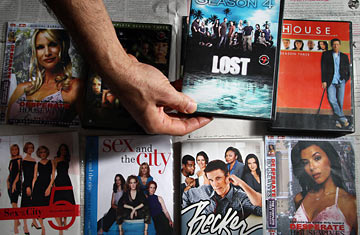
An Iranian man selects a pirated DVD of Lost in Tehran
Back before protests erupted last June, if you were to see a crowd gathered on the streets in Tehran, odds were that people were buying up the latest U.S. hit movie or television show from a black-market vendor. Customers flip through piles of plastic sleeves, looking for an unseen classic or the latest that the Americans have to offer: Avatar, District 9, Invictus, the second Night at the Museum, the first Godfather. One can find Desperate Housewives and 24. At about one toman each (approximately $1), the DVDs are affordable as an occasional indulgence for most residents of the capital (even if a copy of Reservoir Dogs turns out to be Hancock or The Blind Side recorded by a handheld camera in a movie theater). Those residents, however, are willing to shell out the hefty sum of 30 to 50 toman for the hottest bootleg in Iran: Lost.
For the past two years, the U.S. TV series has dominated the underground DVD market in Tehran; almost nowhere in the world is the sixth and final season of Lost anticipated more than in Iran. Initially discovered in October 2008 by a few Iranians with access to high-speed Internet, the show has become Tehran's "gotta have it" DVD item. (Certainly, nothing compares to it on Iranian state television, with its cooking shows and documentaries.) Today it is next to impossible to find a young person in the capital — be it in the affluent north of the city or the working-class south — who has not seen or at least heard of Lost. In some quarters, not knowing what Lost is, or worse, betraying a lack of interest in the program, invites scorn and ridicule.
For expatriate Iranians, it's double jeopardy. I arrived in Iran in early 2009, still mired in the wilds of Season 2, which had ended some three years earlier. My cousins berated me mercilessly. "What, you don't know about Jughead? Tricia Tanaka or the Man from Tallahassee?" And this was from people who followed the show's dialogue by way of subtitles (bootleg fare is subtitled by college students pursuing degrees in English who toil away in anonymity). For my cousins, it was inconceivable that someone living in the U.S., with direct access to the show, would not be up to date on what was happening with the plot and characters.
The tropical-island setting is an important part of the show's appeal. "People here tend to live in their own fantasies, or any world but the real one," says Ghazaleh, a young graduate student from northern Tehran. If escape is not possible — as appears to be the case for Jack, Hurley and Kate — then at least our trapped heroes can live in paradise, even if a smoke monster or the occasional polar bear threatens their existence. "If this story had taken place in Siberia, then nobody would have watched," says Masoud, a 28-year-old engineer from Tehran. The point is for the viewer to be able to escape, even if the characters cannot. "Today an Iranian says to himself, I've got Internet, I've got satellite, I've got money, but I don't have freedom," says Masoud. "So at least I'll take pleasure in this world and live in a manner that is good and not in the manner that the clerics say."
Could the show be a paradigm for the country's general, if not pathological, sense of social and political captivity? The closest rival Lost has in Iran is Prison Break, a TV series that had only a moderate following in the U.S. Before that, there was Jewel in the Castle, a melodrama from South Korea about a young girl working as an indentured cook in the royal kitchen of an ancient monarch who manages to free herself after a lifetime of struggle. But Lost and its mysteries appeal even more strongly to Iranians. "In Iran, people are drawn to stories that are unpredictable," observes Masoud. Sometimes to excess: it is not unheard of for Iranian fans to go on Lost benders that last weeks.
Perhaps it's just good entertainment. Another secret to Lost's success in the Islamic Republic is that it's family-friendly. Unlike in the U.S., the television in Iran tends to be in its own room, away from the dinner table. Families generally sit together to watch shows — veritable home cinemas. (Iranians are notorious film buffs, their love affair with movies stretching back to the birth of cinema itself. The first films were brought to Iran in 1900 by the monarch Mozaffar al-Din Shah, just five years after the Lumière brothers premiered their light machine in Paris.) In order for a film or TV series to truly achieve cult status, it has to be viewable by all members of the household. A great drama and entertainment for adults, Lost is also sexy enough to keep the 14-year-old boy in the room happy but not so risqué that he'll die from embarrassment because his mom is sitting next to him.
Lost came out in a time in Iran when watching a show at home with family and friends was more exciting than anything going on outside. The 2009 presidential election and subsequent rise of the opposition Green Movement changed that. Nonetheless, innumerable Iranians will see the final season of Lost through to the end. "People are very excited about Season 6. They have waited long enough for it," says Ghazaleh. The executive producers of Lost have already promised viewers that not every single mystery will be answered. It remains an open question whether the various plot points of Lost will be resolved before the current political situation in Iran.
